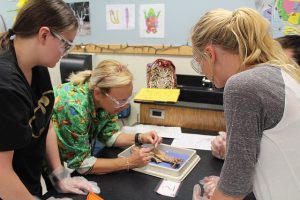Perhaps you’ve heard about the benefits of science, but you think it has its fair share of drawbacks. You may even be aware that there are some things that you simply cannot know for sure without first visiting a laboratory and seeing for yourself. If so, this article is for you! You see, while there are many people who will tell you that science is just a bunch of random nerds obsessed with proving their own theories and making stuff up as they go along, there’s actually much more to it than that. From exploring the world through observation and experimentation to making informed decisions based on facts, science has plenty to offer everyone – provided they understand what it really is and what it doesn’t do.
There is no such thing as constant and absolute truth in science.
This one might surprise a lot of people, especially those who think of scientists as being very precise and factual people. The truth is that science doesn’t have an “absolute truth” to deliver. Instead, science is all about finding truth in a wide range of different places – including the data, the conclusions, and the logic behind the conclusions. In other words, while science may not deliver an “absolute truth,” it does deliver a “truth that may not yet be knowable.”

Science is a path of finding the truth
As we’ve discussed, science mainly uses two types of tools: observation and Experimentation. Both of these are crucial to science, but what’s interesting is that specific areas of science can be used to make bold claims about the future. For example, the field of astrophysics studies the nature of the Universe, looking for signs of intelligent design.
However, because the field of astrophysics studies things that are “out there,” it’s difficult to know for sure if intelligent design is the solution to all of life’s problems or not – and that’s what making bold claims about the future is all about, after all. Theories based on facts based on observation and Experimentation are the two main methods used by scientists to find the truth.
Facts are not always right – but sometimes they’re forced to be.
Although scientists do their best to be objective and scientific while conducting their research, sometimes they make mistakes. This happens when scientists don’t know the answer to a question and they have to guess.
Luckily, there are a few ways to overcome this problem. One way is to take data that was generated by an experiment, correct for any human or environmental factors that might have altered the data, and then repeat the experiment, this time with just the data collected. However, this process only works if the data is accurate, to begin with. After all, if you know the experiment was 100% accurate, then you don’t have to correct for human or environmental factors that might have altered the results.
But what if the data collected is erroneous? In that case, the only way to solve the problem is to retry the experiment, this time with just the correct data. This is known as retry-and-correct. Being forced to correct data is known as replication. Replication is what scientists do when they don’t know the answer to a question.
Science can be fun and rewarding
Although we’ve already mentioned that science can be tough, it is also incredibly rewarding. In fact, being a scientist may be the most rewarding job in the world. You not only get to solve puzzles and crack codes, but you also get to make discoveries and push the frontiers of knowledge. Plus, as a scientist, you get to use your talents in a very rewarding and creative way. You also get to meet some amazing people – both present and past – and share your discoveries with the world.

Science can be tough too.
Despite all the perks that science has to offer, it’s not a perfect, easily obtained career. The key to success as a scientist is to recognize when you’re getting sidetracked and to maintain focus on the main goal – which is to find the truth. Also, while being a scientist may not be as glamorous as being a rock star or a movie star, it’s definitely no less desirable – especially since you can use your knowledge to help improve the quality of life for people around the world.
But the rewards are well worth it!
The rewards that come with being a scientist are absolutely priceless. From being able to make a significant contribution to the knowledge of mankind through science, to collect a salary for your troubles, being a scientist is incredibly rewarding. There are many jobs in the world that are much more lucrative – and less fulfilling – than being a scientist. But as a scientist, you get to do what you love and make a real difference to the world. What’s not to love about that?


